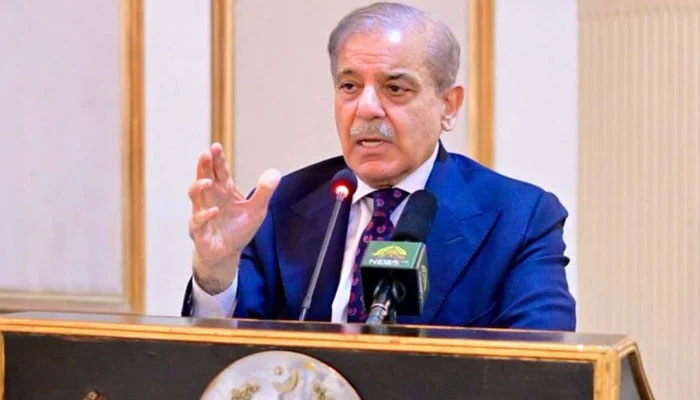PM orders power reforms to slash costs, save Rs4.743tr
Prime minister announced that Pakistan is moving towards establishment of free electricity market
ISLAMABAD: Prime Minister Shehbaz Sharif on Thursday approved the revised 10-year Integrated Generation Capacity Expansion Plan (IGCEP) 2024–2034 and directed its swift implementation, aiming to save Rs4.743 trillion through sweeping reforms in the country’s power sector.
The plan, aimed at reducing electricity costs and ensuring long-term sustainability, is projected to save the national economy more than $17 billion (Rs4,743 billion) by eliminating expensive projects, shifting to local energy resources and introducing a competitive electricity market.
Chairing a high-level meeting on the energy sector, the prime minister said the government is committed to providing affordable and sustainable electricity to the public. He noted that following a recent reduction of nearly Rs7.41 per unit in electricity tariffs, the government is pursuing further relief for consumers through structural reforms in the energy sector. He emphasised that no delays in the execution of energy projects would be tolerated and directed authorities to prioritise the early completion of major hydropower projects, including the Diamer-Bhasha Dam.
The prime minister announced that Pakistan is moving towards the establishment of a free electricity market, which will allow competitive bidding and supply of power. He said this step would help ensure the long-term sustainability of electricity supply and bring further reductions in tariffs. The new market-based approach is expected to encourage private sector participation and increase efficiency in power generation.
During the briefing, officials informed the meeting that the IGCEP had been re-evaluated and significantly improved to reflect current ground realities and future energy demands. As a result, a total of 7,967 megawatts of high-cost and non-essential power projects have been removed from the plan, resulting in estimated savings of $7 billion (Rs1,953 billion).
Furthermore, by adjusting the completion timelines of several projects, an additional $10 billion (Rs2,790 billion) in savings will be realised. The two factors would help save Rs2 per unit in the next 10 years’ time. The revised plan reduces the originally proposed capacity expansion from 14,984 megawatts to 7,017 megawatts, focusing instead on projects that are economically viable and based on local resources.
Officials highlighted that the government would now give priority to electricity generation through indigenous sources such as hydropower, solar, nuclear and wind energy, instead of relying on imported fuels like coal and gas. Another key reform under the new plan is the gradual phasing out of capacity payments made to power producers.
The officials said that the revised IGCEP 2024-34 would be tabled before National Electric Power Regulatory Authority (Nepra) for approval. The power regulator would hold public hearing on the revised IGCEP and then it would be accorded final approval.
Shehbaz praised Federal Minister for Power Sardar Awais Leghari and his team for their role in achieving substantial savings for the country.
Later, the power minister in a video statement said, “Had the old policies continued, consumers would have borne an additional burden of Rs4.743 trillion. We have eliminated 7,000 megawatts worth of costly power projects, providing significant relief to the public.”
Under the new plan, the government would no longer purchase electricity under outdated models. “The single-buyer model and the cost-plus tariff system have been scrapped,” Leghari said, adding that new power purchase agreements would lead to further savings of Rs2.79 trillion.
-
 Prince Harry Reacts As Beatrice, Eugenie's Names Surface In Epstein Emails
Prince Harry Reacts As Beatrice, Eugenie's Names Surface In Epstein Emails -
 Cyprus Joins European AI Race: What It Means For Greek LLMs And Regional Innovation
Cyprus Joins European AI Race: What It Means For Greek LLMs And Regional Innovation -
 Amazon Soon To Launch 'AI Content' Marketplace, Says Report
Amazon Soon To Launch 'AI Content' Marketplace, Says Report -
 Is AI Reliable For Health Advice? New Study Raises Red Flags
Is AI Reliable For Health Advice? New Study Raises Red Flags -
 WhatsApp Web Starts Rolling Out Voice And Video Calling For Beta Users
WhatsApp Web Starts Rolling Out Voice And Video Calling For Beta Users -
 Catherine O’Hara’s Cause Of Death Finally Revealed
Catherine O’Hara’s Cause Of Death Finally Revealed -
 Swimmers Gather At Argentina’s Mar Chiquita For World Record Attempt
Swimmers Gather At Argentina’s Mar Chiquita For World Record Attempt -
 Brooklyn Beckham, Nicola New Move Could Leave David, Victoria Reeling
Brooklyn Beckham, Nicola New Move Could Leave David, Victoria Reeling -
 Anthropic Criticises ChatGPT Ads As OpenAI Begins Testing Advertising In AI Chats
Anthropic Criticises ChatGPT Ads As OpenAI Begins Testing Advertising In AI Chats -
 YouTube Star MrBeast Acquires Step: Redefining Finance For Gen Zs
YouTube Star MrBeast Acquires Step: Redefining Finance For Gen Zs -
 Sarah Ferguson Plans Big Move To Cause ‘serious Damage’ To Andrew
Sarah Ferguson Plans Big Move To Cause ‘serious Damage’ To Andrew -
 Trump Nears 500 Press Interactions In His Second Term, Surpassing Former President Biden
Trump Nears 500 Press Interactions In His Second Term, Surpassing Former President Biden -
 Hailee Steinfeld Reveals Her Plans To Return To Music
Hailee Steinfeld Reveals Her Plans To Return To Music -
 Elon Musk Unveils SpaceX Plan For Civilian Moon, Mars Trips
Elon Musk Unveils SpaceX Plan For Civilian Moon, Mars Trips -
 MTG Commander Banned Update: Wizards Frees Infamous Instant-win Card
MTG Commander Banned Update: Wizards Frees Infamous Instant-win Card -
 Royal Family Braces For ‘final Blow’ As Andrew Scandal Deepens
Royal Family Braces For ‘final Blow’ As Andrew Scandal Deepens




